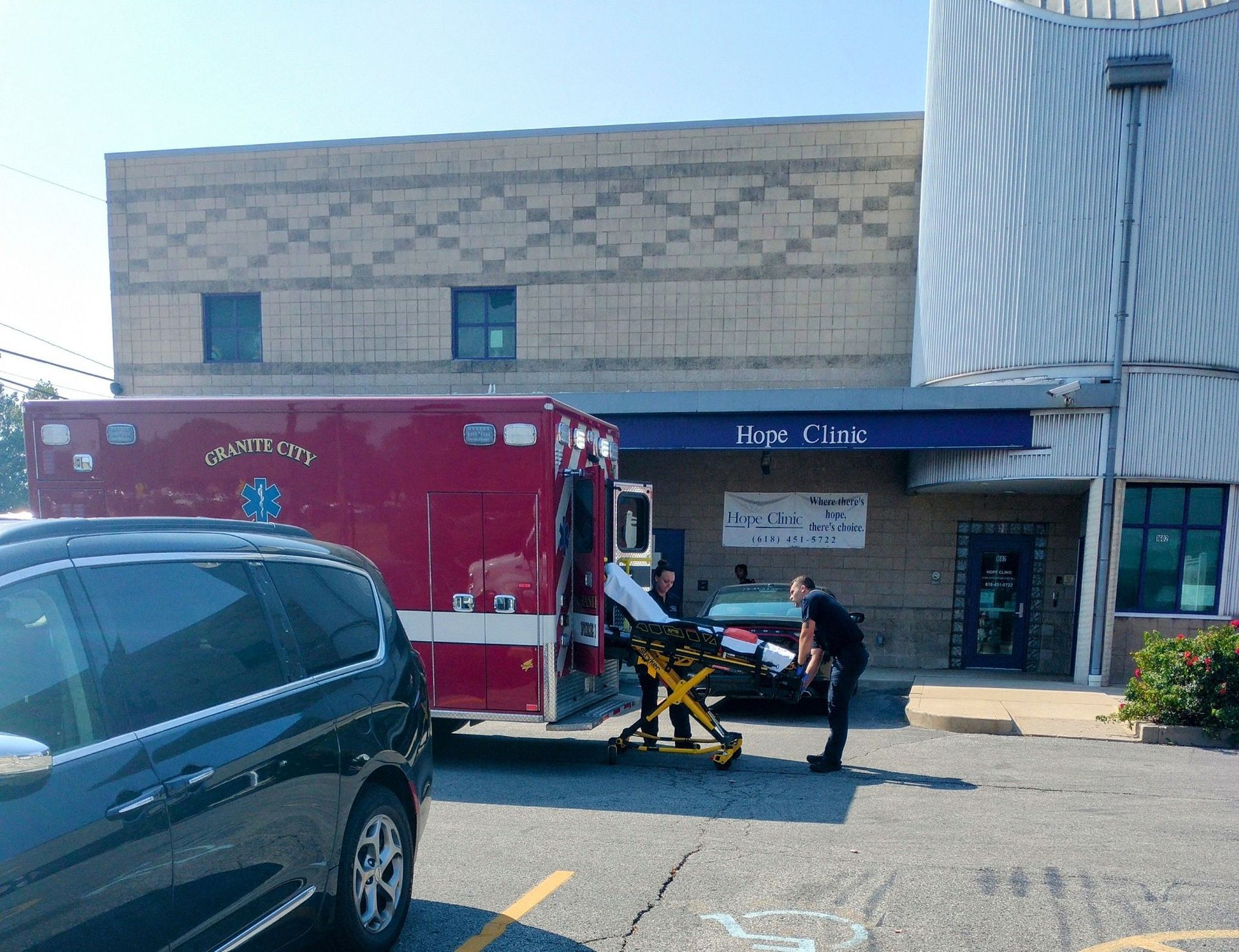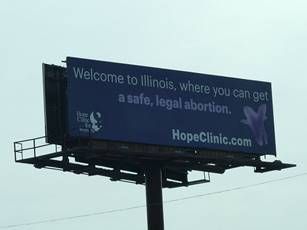The Abortion Industry is Crumbling
Foreword by Angela Michael
March 10, 2009
"...legal abortion is meaningless if no one is able or willing to perform it." - Warren Hern, Abortionist
This is more confirmation that here in America ’s Heartland the abortion industry is crumbling. This past fall the largest Midwest late-term abortion mill had to shutdown due to a lack of baby killers and numerous lawsuits that have been filed against this chop-shop. Read related article: Hope Clinic is Hemorrhaging
The directoress, Ms. Burgess, failed to mention in the accompanying article the two abortionists she hired from Chicago lasted briefly, as they were butchering and hurting women, and at least four lawsuits were filed in 2008 for gross negligence, battery, and malpractice against these female abortionists featured on our website. Legalized abortion was supposed to put an end to “back alley” abortions and the mutilations of women. Just part of the fable. “Where there is ‘choice’ there is Hope.”
Sally Burgess recently commented to a reporter when asked “What about the Michaels?” she said, “They are relentless,” referring to our daily ministry outside the Hope abortion Clinic.
The following article posted in the New York Times reiterates what we have been reporting. It’s not a question if legalized abortion will come to an end; it's a matter of time.
“Abortion opponents will achieve their goal without ever having to overturn Roe vs Wade.” ~Kate Michelman, former director NARAL
“When I look back on the Roe v Wade decision I thought these words had been written in granite. But I’ve learned it was not granite. It was more like sandstone. The immediate problem is: where will the doctors come from?”~ Sarah Weddington, pro-abortion attorney who successfully argued the Roe v Wade case.
Where to Pass the Torch?
March 8, 2009
Generation B
GRANITE CITY , Ill.
WHEN Anne Baker graduated from Southern Illinois University in 1975, she was pleased to be hired as a birth control counselor for a Planned Parenthood clinic, though it was not her dream job. “I wanted to be an abortion counselor,” she recalled. “I wanted it so bad.”
Ms. Baker was thrilled when the Supreme Court legalized abortion in its 1973 Roe v. Wade decision. “I remember going to rallies, and this was so long ago, instead of calling opponents pro-life, we called them ‘fetus supremacists.’ ” She had been raised by her Catholic divorced mother and her great-aunt. They had little money, and to put herself through college, she worked a year, saved, went to school for a year, then worked the next year. “I was so convinced that to stay independent, women needed abortion for a backup,” she said. “It was like a calling for me.”
And so, the following year, in 1976, when a counseling job opened at the abortion clinic here, a 30-minute drive across the Mississippi River from her home in St. Louis, Ms. Baker grabbed it and never left, becoming the head of counseling at the Hope Clinic for Women.
In that time, she estimates she has done abortion counseling for 25,000 women and a few girls, some as young as 11, others as old as 53. “It’s been my dream job,” she said. “I wanted to be standing by the side of someone who was making a decision that others would condemn her for, and support her and link arms and say, You’re a good person making a hard decision, and that’s what I’ve done for 33 years.”
But here is the question: As Ms. Baker’s generation approaches retirement — women whose commitment to abortion was forged in the pre-Roe v. Wade days — will younger women take their places at the clinics?
“We worry about that a lot,” said Sally Burgess, executive director of the Hope clinic, who is also chairwoman of the National Abortion Federation, the main professional support group for abortion providers. “Younger women have always had access to abortion care, they don’t fully appreciate the battle that was fought to have it available to them. And more important, I don’t think they know how precarious the option is at this point, even with Obama’s election.”
“What I observe for women in their 20s and 30s — there are fewer who really have the fire in the belly for this,” she said.
At 50, Ms. Burgess is the youngest member of the Hope clinic’s leadership team, which includes Ms. Baker; Debbie Wiehardt, 57, the office supervisor; and the two doctors performing abortions (the only men on the 30-person staff), who are both in their 60s.
A recent survey of 273 abortion clinics published in the journal Contraception found that 64 percent of their doctors were at least 50 years old, and 62 percent were men. Abortion advocates like Kelli M. Conlin, president of Naral Pro-Choice New York, say that while it’s not a problem finding younger doctors and support staff to work in clinics in large urban areas like New York City, Los Angeles and Chicago, it is an issue in more conservative places, like upstate New York; smaller Midwestern cities; Southern states, including Texas; and rural areas.
For eight years, Ms. Burgess said, she has been trying to add a doctor who was not only younger but a woman. “Many women prefer females, and it’s particularly important if there’s been abuse,” she said. She has participated in a program with the University of Chicago aimed at teaching young physicians to do abortions, and though two women came here to train, neither stayed. “I take every opportunity to put feelers out for doctors,” she said. “We’re aging, we’re looking for leaders to take over for us.”
The staff at abortion clinics typically earn less than their counterparts in other medical disciplines. “We were able to pay about half what a doctor’s office or hospital paid,” said Tina Welsh, 67, who in 1981 helped found the Women’s Health Center , a nonprofit abortion clinic in Duluth , Minn. She was ready to retire as director in 2005, but couldn’t find a replacement.
Ms. Welsh said that when she finally did retire in 2008, she was making under $60,000 a year. After a two-year search that yielded little, she replaced herself with her associate director, who is in her 50s.
Most of the women hired at the Duluth clinic from 1981 to the present — nurses, counselors, lab technicians — came of age in the pre-Roe v. Wade era, Ms. Welsh said. When her nurse practitioner retired several years ago, she could not find a replacement and instead hired two registered nurses. Finally, last month, the clinic hired a nurse practitioner — a woman in her early 60s who had retired and decided to work again part time.
The lower pay at the nation’s 816 clinics — which provide about 94 percent of abortions according to a 2008 study in the journal Perspectives on Sexual and Reproductive Health — reflects a modest revenue stream. The average cost for a first-trimester abortion — surgery that typically involves a four-hour stay — was $413 in 2006, said Rachel Jones, a senior researcher at the Guttmacher Institute. Ruth Arick, an abortion care consultant, said: “At many clinics, fees have not changed much since the mid-1970s. The cost was $175 then and I can still find you an abortion for that price in Detroit and Miami .”
While doctors like the two at the privately owned for-profit Hope clinic can supplement their incomes with a private gynecological practice, that’s rarely true of the other workers.
“People running these clinics,” Ms. Arick said, “have brains wired for social work and social justice even though they’re in the medical business.” Studies show the typical woman having an abortion is a poor, single parent in her 20s. Many don’t have insurance, or the insurance won’t cover abortion. Ms. Burgess said half who come to her clinic need financial help, and she employs a staff member to search for charitable grants.
Working at an abortion clinic intrudes into a person’s private life. “I never wanted to be political,” Ms. Welsh said, “but for the clinic to survive, I had to know all the legislators from our area. They can make or break you.”
“You work in abortion,” Ms. Burgess said, “it will affect who you will date, the parties you will be invited to.” Every day when she comes to work, she’s picketed. On the weekday I visited, 15 protestors carried signs comparing abortion to Hitler’s Holocaust.
A decade ago, after an Atlanta clinic was bombed, Ms. Welsh had to take terrorism prevention classes. “I’m a director of a nonprofit, and I’m sitting there thinking, Why am I learning about letter bombs?” she recalled. “My board decided after that, only I could open the clinic mail — I was the only one they insured, to save money on the premium.”
On July 11, 2008, protestors picketed Ms. Welsh’s retirement party.
It’s been years since there was violence at the Hope clinic. In 1982, the clinic was firebombed, and eight months later, the owner and his wife were kidnapped for a week, before being released. When Ms. Burgess arrived as director in 1990, all the windows were still boarded.
But in 1999, she opened a new clinic building that is twice as big and tastefully decorated with paintings, dried flowers, framed letters of commendation from former President Bill Clinton and former Vice President Al Gore. The building was designed like a fortress — walls are three cinder blocks thick, windows are bullet-resistant and out front is a concrete booth where an armed guard is stationed.
After 33 years, Ms. Baker doesn’t worry, but she is still cautious, having the guard escort her to her car during periods when anti-abortion protest historically flares up — Christmas and Easter; the Jan. 22 Roe v. Wade anniversary; Mother’s Day. Her greatest joy is when a woman tells her, “You make me feel like I’m not a bad person.” Her biggest disappointment is how little has changed since the 1970s. “I used to hope some day, instead of people being so scared and ashamed, that the taint, the stigma, would stop. It has not.”
E-mail: Generationb@nytimes.com











